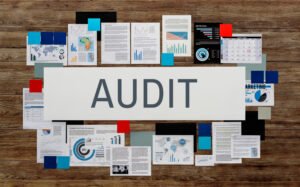DEEPFAKE- A POTENTIAL THREAT TO E-KYC
Blogs DEEPFAKE- A POTENTIAL THREAT TO E-KYC KYC means to ‘know your customer’ which is an effective way for an institution to confirm and verify
In the fast-paced and ever-evolving corporate landscape, businesses face a multitude of challenges, including the need to adhere to complex regulations and legal requirements. Corporate compliance plays a pivotal role in ensuring that companies operate ethically, responsibly, and in accordance with the law. Yet, many organizations find the world of corporate compliance daunting and convoluted. In this blog, we aim to demystify corporate compliance, offering businesses a comprehensive guide to navigate this critical aspect of their operations successfully.
In the fast-paced and ever-evolving corporate landscape, businesses face a multitude of challenges, including the need to adhere to complex regulations and legal requirements. Corporate compliance plays a pivotal role in ensuring that companies operate ethically, responsibly, and in accordance with the law. Yet, many organizations find the world of corporate compliance daunting and convoluted. In this blog, we aim to demystify corporate compliance, offering businesses a comprehensive guide to navigate this critical aspect of their operations successfully.
1. Understanding Corporate Compliance:
Corporate compliance refers to the processes, policies, and actions that organizations implement to ensure they follow relevant laws, regulations, and industry standards. It is a proactive approach to risk management, ensuring that businesses mitigate potential legal, financial, and reputational risks. Compliance is not limited to large enterprises; even small and medium-sized businesses must address compliance requirements in their respective domains.
2. Key Areas of Corporate Compliance:
Corporate compliance encompasses various key areas that demand attention and adherence. Some of these include:
a. Regulatory Compliance: This aspect deals with compliance requirements imposed by governmental bodies and industry-specific regulators. These regulations can span a wide range of domains, such as data privacy, environmental protection, labor laws, consumer protection, and financial reporting. Businesses must thoroughly understand the relevant regulations and establish processes to meet these obligations.
b. Internal Policies and Procedures: Apart from adhering to external regulations, companies must establish their internal policies and procedures. These guidelines define the company’s ethical standards, code of conduct, and expectations from employees. Clear communication of these policies is essential to ensure employees’ awareness and compliance with the company’s values.
c. Data Protection and Cybersecurity: With the increasing reliance on technology and data-driven processes, data protection and cybersecurity have become paramount. Businesses must safeguard sensitive information, both of their customers and employees, to prevent data breaches and potential legal repercussions.
d. Anti-Money Laundering (AML) and Anti-Corruption: Businesses must take measures to prevent money laundering and corrupt practices within their operations. Implementing AML and anti-corruption policies is crucial for companies operating in a globalized business environment.
e. Corporate Governance: Corporate governance involves structuring and managing the company in a way that ensures accountability, transparency, and fairness. Establishing effective corporate governance practices strengthens the organization’s overall compliance framework.
3. Importance of Corporate Compliance:
Compliance is not just about avoiding penalties and fines. Embracing a robust compliance culture yields several benefits for businesses, such as:
a. Risk Mitigation: Compliance helps identify potential risks and enables companies to take proactive measures to mitigate them, reducing the likelihood of legal disputes and financial losses.
b. Enhanced Reputation: A commitment to compliance enhances a company’s reputation among customers, investors, and partners. It fosters trust and confidence in the organization’s ability to conduct ethical and responsible business practices.
c. Increased Efficiency: Streamlined compliance processes improve the efficiency of business operations, reducing the time and resources spent on managing legal and regulatory issues.
d. Competitive Advantage: Compliance can become a unique selling point for businesses. Customers and partners often prefer to engage with companies that demonstrate a strong commitment to compliance and ethical conduct.
Navigating the complexities of corporate compliance is a challenging but essential task for businesses of all sizes. By understanding the various facets of compliance and integrating it into their organizational culture, businesses can protect themselves from legal risks, build trust with stakeholders, and foster a reputation for integrity. Embracing compliance as a core value leads to a more sustainable and successful business in the long run. Remember, compliance is not an option; it’s a necessity for businesses aiming to thrive in today’s conscientious and regulated world.
1. What is corporate compliance, and why is it important for businesses?
Corporate compliance refers to the processes, policies, and actions that organizations implement to ensure they follow relevant laws, regulations, and industry standards. It is essential for businesses to mitigate legal, financial, and reputational risks and build a reputation for ethical conduct and responsible operations.
2. Which areas does corporate compliance cover?
Corporate compliance covers a wide range of areas, including regulatory compliance (governmental and industry-specific regulations), internal policies and procedures, data protection and cybersecurity, anti-money laundering and anti-corruption measures, and corporate governance.
3. What are the consequences of non-compliance for businesses?
Non-compliance can lead to severe consequences, including hefty fines, legal disputes, damaged reputation, loss of customer trust, and even criminal liabilities for individuals within the organization.
4. How can businesses stay updated on changing regulations and compliance requirements?
Businesses can stay updated on changing regulations by closely monitoring governmental and regulatory body announcements, subscribing to relevant industry publications, and consulting legal experts or compliance consultants.
5. Is corporate compliance only applicable to large corporations?
No, corporate compliance is relevant to businesses of all sizes. Small and medium-sized enterprises (SMEs) must also address compliance requirements in their respective industries to operate legally and responsibly.
6. How can a company establish a robust compliance culture within its organization?
To establish a robust compliance culture, a company should develop clear and comprehensive policies and procedures, communicate them effectively to all employees, provide regular compliance training, and lead by example from the top management.
7. How can businesses ensure data protection and cybersecurity compliance?
Businesses can ensure data protection and cybersecurity compliance by implementing secure data storage and handling practices, conducting regular risk assessments, educating employees on data security, and complying with relevant data protection laws like GDPR, CCPA, etc.
8. What is the role of employees in ensuring corporate compliance?
Employees play a vital role in corporate compliance. They must be aware of the company’s policies, adhere to ethical standards, report any potential violations, and participate in compliance training programs.
9. Can outsourcing compliance responsibilities be a viable option for businesses?
Outsourcing compliance responsibilities can be a viable option for businesses, especially for SMEs without in-house compliance expertise. However, it is crucial to carefully select reliable compliance partners and maintain oversight to ensure all obligations are met.
10. How can businesses use compliance as a competitive advantage?
Businesses can use compliance as a competitive advantage by highlighting their commitment to ethical conduct, data security, and responsible business practices in marketing materials and communications. This approach can attract customers, investors, and partners who value compliance-conscious organizations.
Blogs DEEPFAKE- A POTENTIAL THREAT TO E-KYC KYC means to ‘know your customer’ which is an effective way for an institution to confirm and verify

Blogs Intellectual Property Protection: Safeguarding Your Innovations In a rapidly evolving world driven by innovation and creativity, the protection of intellectual property (IP) has become

Blogs Navigating Mergers and Acquisitions: A Company Secretary’s Perspective Mergers and acquisitions (M&A) have become an integral part of today’s dynamic business landscape. Companies across

Blogs Secretarial Audit: Unveiling the Hidden Compliance Gems In the dynamic and complex business landscape, companies must adhere to various legal and regulatory requirements to

Blogs Mastering Board Meetings: Tips for Effective Corporate Governance In today’s dynamic business landscape, ensuring good governance is paramount for the long-term success and sustainability

Blogs The Role of Company Secretaries in Ensuring Good Governance Good governance is the backbone of any successful organization. It encompasses a set of principles
A Saraswat & Associates, a firm of Practicing Company Secretaries is the rightful owner of this website. This website serves exclusively as an informational platform and does not engage in any form of advertising or solicitation for assignments or professional engagements. The information and materials contained on this website are not intended to constitute, and should not be considered as, legal, financial, or any other professional advice. The content presented here is for informational purposes only and should not be relied upon as a substitute for professional consultation.
Your use of this website does not create a client-professional relationship between us. Any communication through this website or any emails sent, does not establish such a relationship.
We may update this disclaimer from time to time to reflect changes in our practices and services. It is advisable to review this page periodically for any amendments.
“The contents or claims in the website issued by the Advertiser are the sole and exclusive responsibility of the Advertiser. The Institute of Company Secretaries of India does not own any responsibility whatsoever for such contents or claims by the Advertiser.”
By using this website, you agree to be bound by this disclaimer.